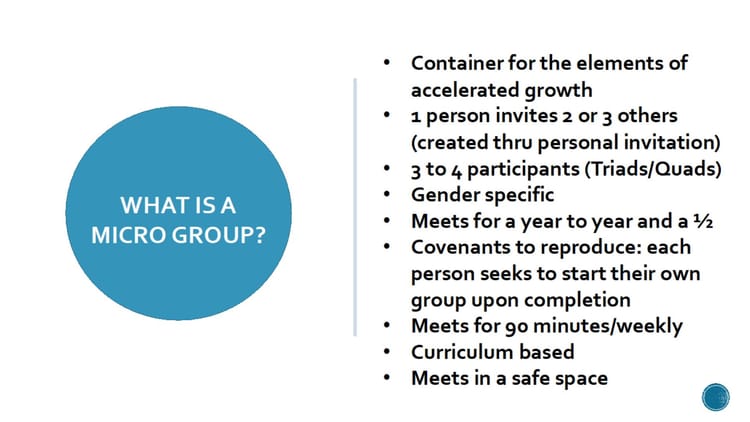Why Church?

We are to stay laser focused on making disciples as the mission of the church of Jesus Christ. C. S. Lewis captures our mission in these powerful words:
“The church exists for no other purpose but to draw men into Christ, to make them little Christs. If they are not doing that, all the cathedrals, clergy, missions, sermons, even the Bible itself, are simply a waste of time. God became man for no other purpose. It is even doubtful, you know, whether the whole universe was created for any other purpose.” - C. S. Lewis, Mere Christianity
Church is more than a church building. WE are the church. We are called to carry out Matthew 28:19-20, The Great Commission.
There is one single command in this text, MAKE DISCIPLES. Because Jesus is the Chief Executive Officer of the Universe who has a mission for us all, He told us what every follower of His is to be about. Jesus says essentially, "I have the authority to tell you what to do because of who I am. But I am not just telling you what to do and leaving you to do it, I am putting my full authority behind you to carry it out."
Go[ing] therefore and MAKE DISCIPLES of all nations, baptiz[ing] them in the name of the Father and of the Son and of the Holy Spirit, teach[ing] them to observe all that I have commanded you. And behold, I am with you always, to the end of the age.”
There is only one command or imperative or "this we must do," and that is to MAKE DISCIPLES. What does Jesus NOT say?
He does not say, "Go and make churches.”
With all of our emphasis in church planting and the need for new churches, Jesus’ first priority was the lives of individuals. Jesus provides us with His thumbnail definition or characteristics of a disciple in these short two verses.
There is a very precise structure to the Great Commission. The main command, MAKE DISCIPLES, is supported by three participles. A participle is a verbal adjective ending in “ing.” There are three action words or verbs that describe make disciples.
- “Therefore, as you are go[ing], MAKE DISCIPLES of all nations,
- Baptiz[ing] them in[to] the name of the Father and of the Son and of the Holy Spirit,
- Teach[ing] them to obey all that I have commanded you.”
Three verbal adjectives [participles] define a disciple. Disciples are going, baptizing, and teaching.
We can see that disciplemaking covers a wide range:
- Initially disciples are going to people to share the good news of the Gospel.
- Then once someone has embraced or been embraced by Jesus, they are baptizing (immersing) converted people into the life of the triune God.
- Finally they enter into the lifelong pursuit of obeying all that Jesus commanded.
Let’s look at each of these three participles as critical elements in what makes up a reproducing disciple of Jesus.
1-As you are going…to all nations
First, GOING to all nations (peoples): Dale Bruner simply says, “Move out.”
You might recall the popular movie, Field of Dreams, with the well-known phrase, “If you build it, he will COME,” meaning, if you turn some of your cornfields into a baseball field, some famous baseball players from the past will return.
I think the church has adopted a similar strategy. We think, if we do church well, people will COME. If we have great preaching, awesome music, a great youth program, etc., then the world will COME to us.
On the contrary, Jesus says, “Go, move out.” From our inception we were called to serve a missionary God. The scope of the disciple’s call is to all people. Jesus came to establish a worldwide kingdom without borders.
Let’s highlight three things that capture a “go” mentality.
The first step for a disciple is to catch the “GO” spirit. Andrew Walls has observed that Christianity is different from all the other world religions because we have continually shifted our geographical center.
- Islam emanates from Mecca.
- Buddhism is largely in the far East (China and Tibet).
- Hinduism is the national religion of India and Nepal.
We live at a time of the massive geographical shift of world Christianity to the Southern Hemisphere. Look at Africa.
In 1900 Christianity was still largely a Western religion with European roots. Sub-Saharan Africa was 9% Christian. By 2023 Africa had become 62% Christian and growing. If you combine African and Latin American Christianity, by 2050 only 1 in 6 Christians will be white and the Global South will be its center.
Jesus tells us to make disciples of all “nations,” which is actually all ethne from which we get “ethnic groups.” Missiologists have described these as “people groups” with their own distinct language and culture. At their latest count, the Joshua Project, which tracks distinct “people groups,” says that they can identify 17,453 people groups worldwide, while 7,400 are unreached.
Unreached people are defined as those who do not have a church in their language or culture. The ideal is that people can hear the Gospel in their own native tongue and within their cultural setting.
Jesus shared another version of the Great Commission in Acts 1:8:
“But you will receive power when the Holy Spirit has come upon you, and you will be my witnesses in Jerusalem and in all Judea and Samaria, and to the end of the earth.”
Our job? Be witnesses. Be connectors to Jesus and the Gospel. Be attractive followers of Jesus.
I love the story that Sheldon Vanauken tells in his book A Severe Mercy. Sheldon and his wife, Davy, were students at Oxford University in England in the early 1950s. They came with very negative stereotypes of Christians.
In their words, Christians “were necessarily stuffy, hide-bound, or stupid—people to keep one’s distance from.”
Here was Vanauken’s experience:
“Yet the people we seemed to fall in with at Oxford were keen, deeply committed Christians. We liked them so much that we forgave them for it. We began, hardly knowing we were doing it, to revise our opinions, not of Christianity but of Christians….
The sheer quality of the Christians we met at Oxford shattered our stereotype…. The astonishing fact sank home: Our own contemporaries could be at once highly intelligent, civilized, fun to be with—and Christian.”
It was only a matter of time when their defenses were to be penetrated by Jesus Himself.
Jesus said,
“Let your light so shine before men that they may see your good works and so glorify your Father in heaven” (Matthew 5:16).
Sacrificial acts of mercy still command attention. Nicholas Kristoff is an editorial writer for the New York Times. On several occasions, he has written stories about the impact of evangelical Christians through deeds of mercy. Kristoff recounts the story of 17-year-old Sonia Angeline and her rescue from the town garbage dump in Mozambique.
After 4 days of labor pains, she was a hairsbreadth from death. Katrin Blackert, a 23-year-old volunteer with Iris ministries, encountered her on regular visits to children at the dump. Blackert paid for a cab to get her to a medical center and saved her life. Kristoff concluded,
“I am convinced that we should celebrate the big evangelical push into Africa because the bottom line is that it will mean more orphanages, more schools, and above all, more clinics and hospitals.”
2-Baptizing into the eternal community of the Triune God
Going leads to the second element of making disciples which is “baptizing them into the name of the Father and the Son and the Holy Spirit.”
I believe we have generally missed the mark of Jesus’ intent here. At the simplest level we turn this into a baptismal formula pronounced while touching the head or lowering someone under the waters of baptism. When we think of the significance of baptism, four truths come to mind.
We think of baptism as
- an act of public declaration of our faith;
- a sign of inclusion in the church;
- a cleansing from the guilt of our sin; and,
- a means of identification with the death and resurrection of Jesus. Now that is a lot, but I still do not think it quite gets at the wonder of why Jesus includes baptizing as a central mark of our discipleship.
My eyes were opened when I read John of Damascus’ description of the Trinity as perichoresis, Greek for a circle dance. Choros is a festive dance performed on occasions like weddings or banquets. Adding peri as a prefix, meaning “round about,” emphasizes the circularity of the dance.
Circle dances are very common within the Jewish community. Hava Nagila comes to mind. John pictured the one God who is three persons in a dance of intimacy, equality, and unity, always deferring in love and honor to one another. The one God who is at the same time Father, Son, and Holy Spirit dances in harmonious love at the center of the universe and invites us into the dance.
Paraphrased, “As you are going, MAKE DISCIPLES of all nations, immersing them INTO the life of the eternal three-person community of love who exists at the center of the universe.”
Baptism fundamentally means to be embraced by this reality—we are loved and included in the heart of God. Our core identity is that we have been loved into the very life of God.
3-Teaching them to obey all of Jesus’ commands
Once a person responds to the Gospel’s saving message in Christ, then finds their identity in the eternal community of the triune God, they enter into lifelong vocation of “being taught to obey everything that Jesus commanded.”
John Ortberg has said,
“No one can be a disciple of Jesus because you think you should. You actually have to want it.”
If we follow Jesus out of some obligation, because we have to, that eventually will lead to a dry legalism. So what makes for the “want to”? Dallas Willard notes,
“Unfortunately, many people read that as teaching them what they ought to do, but it’s talking about teaching them in such a way that they wouldn’t want to be doing anything else.”
Philip Yancy writes,
“I do not get to know God, then do his will.
I get to know God by doing His will.”
Define a Disciple
From this Great Commission a disciple is defined.
- First and foremost, a Christian disciple acknowledges that Jesus is the Lord of the Universe and Lord of our lives.
- Under Jesus’ orders, a disciple moves out to those who need a Savior.
- Once convinced, they are immersed into the life of the eternal triune community that dwells at the center of universe.
- They spend the rest of their life fully following Christ, aligning themselves with all that Jesus commanded.





Member discussion